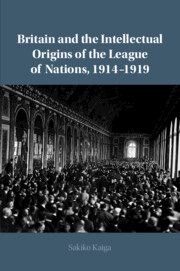
- Cited by 1
-
Cited byCrossref Citations
This Book has been cited by the following publications. This list is generated based on data provided by Crossref.
Hughes, Christopher R. and Shinohara, Hatsue 2023. East Asians in the League of Nations. p. 1.
- Publisher:
- Cambridge University Press
- Online publication date:
- April 2021
- Print publication year:
- 2021
- Online ISBN:
- 9781108774130


